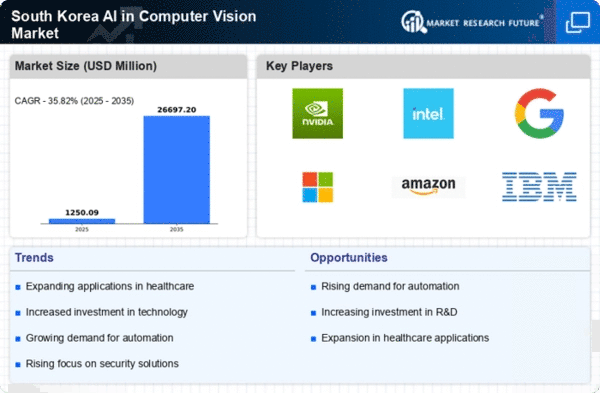Rising Demand for Automation
The ai in-computer-vision market in South Korea is experiencing a notable surge in demand for automation across various sectors. Industries such as manufacturing and logistics are increasingly integrating AI-driven computer vision technologies to enhance operational efficiency. This trend is driven by the need to reduce labor costs and improve accuracy in processes such as quality control and inventory management. According to recent data, the automation market in South Korea is projected to grow at a CAGR of approximately 10% over the next five years. This growth is likely to propel the adoption of ai in-computer-vision solutions, as companies seek to leverage advanced technologies to streamline operations and maintain competitiveness in a rapidly evolving market landscape.
Growing Focus on Data Security
In an era where data breaches and cyber threats are increasingly prevalent, the ai in-computer-vision market in South Korea is witnessing a heightened focus on data security. Organizations are leveraging computer vision technologies to enhance surveillance and monitoring capabilities, thereby improving their security posture. The integration of AI in security systems allows for real-time threat detection and response, which is crucial for protecting sensitive information. According to industry reports, the security market in South Korea is expected to grow by 15% annually, driven by the rising need for advanced security solutions. This trend is likely to bolster the demand for ai in-computer-vision technologies, as businesses and government entities prioritize safeguarding their assets.
Technological Advancements in AI
Technological advancements in artificial intelligence are significantly influencing the ai in-computer-vision market in South Korea. Innovations in deep learning algorithms and neural networks are enhancing the capabilities of computer vision systems, enabling them to perform complex tasks with greater accuracy and speed. For instance, the introduction of convolutional neural networks (CNNs) has revolutionized image recognition processes, making them more efficient. As a result, industries such as retail and healthcare are increasingly adopting these advanced solutions. The South Korean government has also invested heavily in AI research and development, allocating over $1 billion to support initiatives aimed at fostering innovation in this field. This investment is expected to further stimulate growth in the ai in-computer-vision market, as new technologies emerge and existing solutions are refined.
Expansion of E-commerce Platforms
The rapid expansion of e-commerce platforms in South Korea is significantly impacting the ai in-computer-vision market. As online shopping continues to gain traction, retailers are increasingly adopting AI-driven computer vision solutions to enhance customer experience and streamline operations. Technologies such as visual search and automated checkout systems are becoming commonplace, allowing consumers to interact with products in innovative ways. Recent statistics indicate that the e-commerce sector in South Korea is projected to reach $100 billion by 2025, reflecting a CAGR of 12%. This growth is likely to drive further investment in ai in-computer-vision technologies, as businesses seek to leverage these tools to remain competitive in a dynamic retail environment.
Increased Investment in Smart Cities
The push towards smart city initiatives in South Korea is driving growth in the ai in-computer-vision market. As urban areas become more populated, the need for efficient management of resources and infrastructure has become paramount. AI-powered computer vision technologies are being deployed for traffic management, public safety, and environmental monitoring. For example, the South Korean government has committed to investing approximately $2 billion in smart city projects over the next few years. This investment is likely to create a substantial demand for ai in-computer-vision solutions, as municipalities seek to implement intelligent systems that enhance urban living and improve overall quality of life.
















